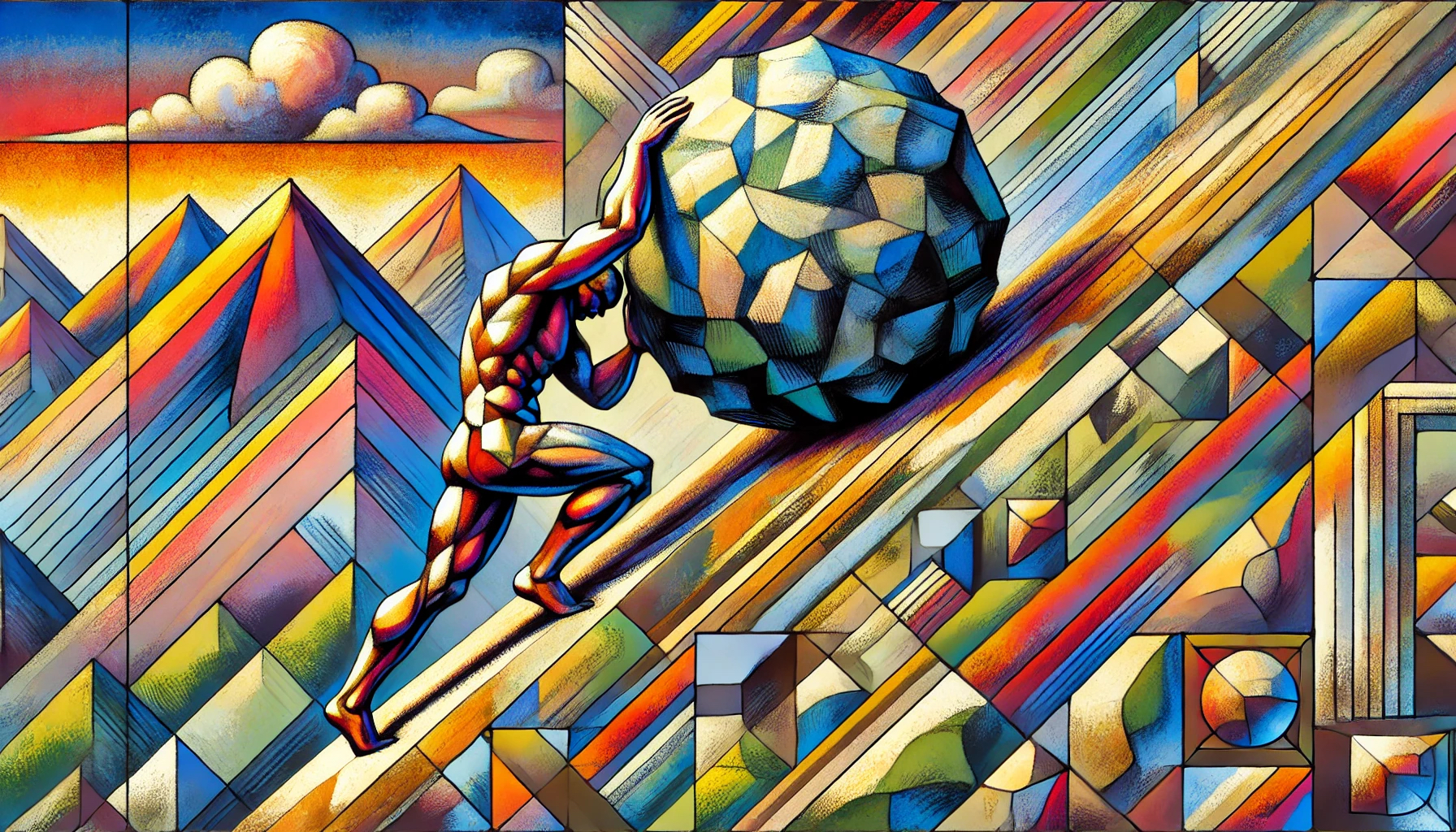
(Pg 31) There exists an obvious fact that seems utterly moral: namely, that a man is always a prey to his truths. Once he has admitted them, he cannot free himself of them. One has to pay something. A man who has becomes conscious of the absurd is forever bound to it.
(Pg 32-33) Now, to limit myself to existential philosophies, I see that all of them without exception suggest escape. Through an odd reasoning, starting out from the absurd over the ruins of reason, in a closed universe limited to the human, they deify what crushes them and find reason to hope in what impoverishes them. That forced hope is religious in all of them.
…
He is left powerless to realize the transcendent, incapable of plumbing the depth of experience, and conscious of that universe upset by failure. Will he advance or at least draw conclusions from that failure? He contributes nothing new. He found nothing in experience but the confession of his own impotence and no occasion to infer any satisfactory principle. Yet without justification, as he says to himself, he suddenly asserts all at once the transcendent, the essence of experience, and the superhuman significance of life when {Jaspers} writes: “Does not the failure reveal, beyond any possible explanation and interpretation, not the absence but the existence of transcendence?” That existence which, suddenly and through a blind act of human confidence explains everything, he defines as “the unthinkable unity of the general and the particular.” Thus the absurd becomes god (in the broadest meaning of the word) and that inability to understand becomes the existence that illuminates everything. Nothing logically prepares this reasoning. I can call it a leap. And paradoxically can be understood Jaspers’s insistence, his infinite patience devoted to making the experience of the transcendent impossible to realize. For the more fleeting that approximation is, the more empty that definition proves to be, and the more real that transcendent is to him; for the passion he devotes to asserting is is in direct proportion to the gap between his powers of explanation and the irrationality of the world and of experience.
(Pg. 36) Everything is sacrificed here to the irrational, and, the demand for clarity being conjured away, the absurd disappears with one of the terms of its comparison. The absurd man, on the other hand, does not undertake such a leveling process. He recognizes the struggle, does not absolutely scorn reason, and admits the irrational. Thus he again embraces in a single glance all the data of experience and he is little inclined to leap before knowing. He knows simply that in that alert awareness there is no further place for hope.
…
Kierkegaard likewise takes the leap. His childhood having been so frightened by Christianity, he ultimately returns to its harshest aspect. For him, too, antimony and paradox become criteria of the religious.
(Pg 41) Seeking what is true is not seeking what is desirable. If in order to elude the anxious question: “What would life be?” one must, like the donkey, feed on roses of illusion, then the absurd mind, rather than resigning itself to falsehood, prefers to adopt fearlessly Kierkegaard’s reply: “despair.” Everything considered, a determined soul will always manage.
(Pg. 51) I don’t know whether this world has a meaning that transcends it. But I know that I do not know that meaning and that it is impossible for me just now to know it.
(Pg. 52 ) Let us insist again on the method: it is a matter of persisting. At a certain point on his path the absurd man is tempted. History is not lacking in either religions or prophets, even without gods. He is asked to leap. All he can reply is that he doesn’t fully understand, that it is not obvious. Indeed, he does not want to do anything but what he fully understands. He is assured that this is the sin of pride, but he does not understand the notion of sin; that perhaps hell is in store, but he has not enough imagination to visualize that strange future; that he is losing immortal life, but that seems to him an idle consideration. An attempt is made to get to admit his guilt. He feels innocent. To tell the truth, that is all he feels–his irreparable innocence. That is what allows him everything. Hence, what the demands of himself is to live solely with what he knows, to accommodate himself to what is, and to bring in nothing that is not certain. He is told that nothing is. But this at least is a certainty. And it is with this that he is concerned: he wants to find out if it is possible to live without appeal.
(Pg. 54) It may be thought that suicide follows revolt — but wrongly. For it does not represent the logical outcome of revolt. It is just the contrary by the consent it presupposes. Suicide, like the leap, is acceptance at its extreme. Everything is over and man returns to his essential history. His future, his unique and dreadful future — he sees and rushes towards it. In its way, suicide settles the absurd.
(Pg. 76) [The Demise of Don Juan] At this point sensual pleasure winds up in asceticism. […] I see Don Juan in a cell of one of those Spanish monasteries lost on a hilltop. And if he contemplates anything at all, it is not the ghosts of past loves, but perhaps, through a narrow slit in the sun-baked wall, some silent Spanish plain, a noble, soulless land in which he recognizes himself.
(Pg. 86) [The Conqueror:] “Knowing that there are no victorious causes, I have a liking for lost causes: they require an uncontaminated soul, equal to its defeat as to its temporary service. For anyone who feels bound up with this world’s fate, the clash of civilizations has something agonizing about it. I have made that anguish mine at the same time that I wanted to join in. Between history and the eternal, I have chosen history because I like certainties. Of it, at least, I am certain, and how can I deny this force crushing me?”
(Pg. 87) [The Conqueror:] “There is but one useful action, that of remaking man and the earth. I shall never remake men. But one must do “as if.” For the path of struggle leads me to the flesh. Even humiliated, the flesh is my only certainty.”
(Pg. 102) I want to know whether, accepting life without appeal, one can also agree to work and create without appeal and what is the way leading to these liberties. I want to liberate my universe of its phantoms and to people it solely with flesh-and-blood truths whose presence I cannot deny. I can perform absurd work, choose the creative attitude rather than another. But an absurd attitude, if it is to remain so, must remain aware of its gratuitousness. So it is with the work of art. If the commandments of the absurd are not respected, if the work does not illustrate divorce and revolt, if it sacrifices to illusions and arouses hope, it ceases to be gratuitous. I can no longer detach myself from it. My life may find meaning in it, but that is trifling. It ceases to be that exercise in detachment and passion which crowns the splendor and futility of a man’s life.
(Pg. 104) What distinguishes modern sensibility from classical sensibility is that the latter thrives on moral problems and the former on metaphysical problems. In Dostoevsky’s novels the question is propounded with such intensity that it can only invite extreme solutions. Existence is illusory or it is eternal. If Dostoevsky were satisfied with this inquiry, he would be a philosopher. But he illustrates the consequences that such intellectual pastimes may have in a man’s life, and in this regard he is an artist.
(Pg. 115) At the moment of death, the succession of his works is but a collection of failures. But if those failures all have the same resonance, the creator has managed to repeat the image of his own condition, to make the air echo with the sterile secret he possesses.
(Pg. 115) Of all the schools of patience and lucidity, creation is the most effective. It is also the staggering evidence of man’s sole dignity: the dogged revolt against his conditions, persevering in an effort considered sterile. It calls for a daily effort, self-mastery, a precise estimate of the limits of truth, measure, and strength. It constitutes an ascesis. All that “for nothing,” in order to repeat and mark time. But perhaps the great work of art has less importance in itself than in the ordeal it demands of a man and the opportunity it provides him of overcoming his phantoms and approaching a little closer to his naked reality.
(Pg. 117) Thus, I ask of absurd creation what I require from thought — revolt, freedom, and diversity. Later on it will manifest its utter futility. In that daily effort in which intelligence and passion mingle and delight each other, the absurd man discovers a discipline that will make up the greatest of his strengths. The required diligence, the doggedness and lucidity thus resemble the conqueror’s attitude. To create is likewise to give shape to one’s fate. For all these characters, their work defines them at least as much as it is defined by them. The actor taught us this: there is no frontier between being and appearing.
(Pg. 117) All that remains is a fate whose outcome alone is fatal. Outside of that single fatality of death, everything, joy or happiness, is liberty. A world remains of which man is the sole master. What bound him was the illusion of another world. The outcome of his thought, ceasing to be renunciatory, flowers in images. It frolics – in myths, to be sure, but myths with no other depth than that of human suffering and, like it, inexhaustible. Not the divine fable that amuses and blinds, but the terrestrial face, gesture, and drama in which are summed up a difficult wisdom and an ephemeral passion.
(Pg. 121) The lucidity that was to constitute his torture at the same time crowns his victory.
(Pg. 121) There is no fate that cannot be surmounted by scorn.
(Pg. 123) The struggle itself towards the heights is enough to fill a man’s heart. One must imagine Sisyphus happy.
